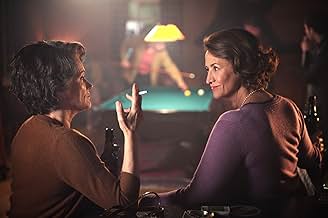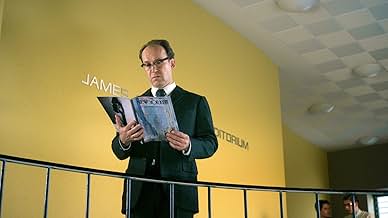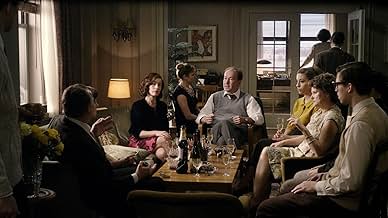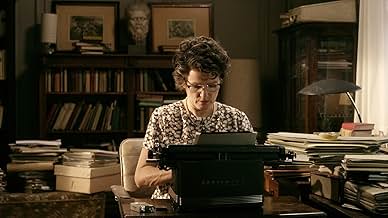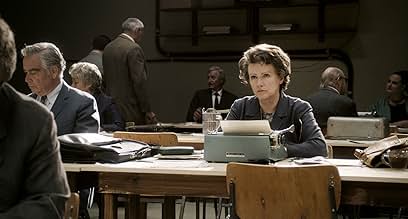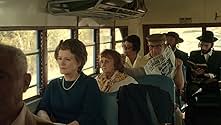Regard sur la vie de la philosophe et théoricienne de la politique Hannah Arendt, envoyée par le New Yorker pour suivre le procès du criminel de guerre nazi, Adolf Eichmann.Regard sur la vie de la philosophe et théoricienne de la politique Hannah Arendt, envoyée par le New Yorker pour suivre le procès du criminel de guerre nazi, Adolf Eichmann.Regard sur la vie de la philosophe et théoricienne de la politique Hannah Arendt, envoyée par le New Yorker pour suivre le procès du criminel de guerre nazi, Adolf Eichmann.
- Director
- Writers
- Stars
- Prix
- 8 victoires et 18 nominations au total
- Student Laureen
- (as Leila Schaus)
Avis en vedette
The film stars Barbara Sukowa as Arendt, who was one of he leading intellectual thinkers of the 20th Century. Arendt's history reads more like fiction than non-fiction. As discussed in the movie, she studied in Germany under the great philosopher Heidegger, was imprisoned in a Nazi internment camp in France, from which she escaped, came to the U.S., and taught at some of the finest universities in our country.
The movie concentrates on the furor that arose after Arendt wrote about the Eichmann trial for The New Yorker. (These articles were later published as a book.) Arendt brought forth her theory of the banality of evil in these articles. Her point was that an evil person like Eichmann was not a monster, but rather a person who has renounced his ability to think, and therefore has renounced his status as a human being.
Arendt believed that Jews who accepted a modicum of authority from the Germans contributed to the Holocaust, because without the Jewish leaders to maintain order, there would have been more chaos and less killing of Jews.
This latter belief made people furious, because it suggested that the Jews were partially responsible for their own fate. This is hard enough to hear now. You can imagine how it was received in 1961, less than 20 years after the Holocaust.
One weakness of the film is that the script suggests that "everyone" was talking about Arendt's writing. Then, as now, the intellectuals of the Upper West Side of Manhattan did not represent a true sample of the U.S. population. Many people were aware of the Eichmann trial, but Arendt's writings passed unnoticed by most people.
Another weakness is that characters in Arendt's life are introduced once, and then never again. If you miss the names the first time, you'll just have to live without knowing who was whom. That's not so bad, because you can accept Barbara Sukowa as Arendt. Everyone else in the film revolves around her.
If you're interested in the Holocaust and in 20th Century philosophy, the film is a must. Even if those topics aren't important to you, the movie is compelling as a study in human behavior and human interactions. We saw the film at the Rochester Jewish Community Center as part of terrific Rochester Jewish Film Festival. If it's available on DVD or at another festival, I recommend that you see it.
As a piece of film-making, however, HANNAH ARENDT grabs the attention and does not let go throughout its 113-minute running- time. As portrayed by Sukowa, Arendt comes across as a forthright person, not frightened of expressing her opinions and responding to any intellectual challenges from close friends such as Kurt Blumenfeld (Michael Degen). Yet beneath that tough surface lurks a profoundly disillusioned person, as she discovers to her cost that her great teacher and mentor Martin Heidegger (Klaus Pohl) does not practice what he preaches. Although insistent on reinforcing the distinction between "reason" and "passion," Heidegger takes the "passionate" decision to associate himself with the Nazi party, and thereby embraces their totalitarian values. Like Eichmnann himself, he chooses not to "think" but to commit himself to an ideology that actively discourages individual thought.
The sense of shock and disillusion Arendt experiences inevitably colors her view of the Eichmann trial. Director von Trotta includes several close-ups of her sitting in the press-room listening to the testimony of Eichmann, his accusers and the witnesses, a quizzical expression on her face, as if she cannot quite make sense of what she hears. She cannot condemn Eichmann, because he has simply followed Heidegger's course of action.
Once the articles have been published, Arendt experiences an almost unprecedented campaign of vilification. Although she is given a climactic scene where she defends herself in front of her students (and her accusers within the university faculty), we get the sense that she is only doing so on the basis of abstractions; her personal feelings are somehow disengaged. She is far more affected when her one-time close friend Hans Jonas (Ulrich Noethen) vows never to talk to her again on account of her views. Philosophers might be able to make sense of the world, but they often neglect human relations.
Consequently our view of Arendt, as portrayed in this film, is profoundly ambivalent. While empathizing with her views about the banality of evil, which reduces people to automata as they claim they were only carrying out orders, even while being involved in atrocities, Arendt herself comes across as rather myopic, so preoccupied with her ideas that she has little or no clue about how they might affect those closest to her. It's a wonder, therefore, that Mary McCarthy (Janet McTeer) chooses to stick with her through the worst of circumstances.
Ingeniously combining archive footage of the Eichmann trial with color re-enactments of what happened during that period, HANNAH ARENDT is a thought-provoking piece, even if we find it difficult to identify with the central character.
All that said, and these are certainly ideas worth mulling over, this is a film for ideas and for philosophy buffs, not for film buffs. Why do I say this? Because this movie is slow, at least for American audiences. The beginning is confusing. We see a woman in New York but we don't know the date. She speaks German. We see a man get off of a bus heading to "Victoria" in the middle of nowhere. He is promptly kidnapped. We don't know when or where. Eventually, we learn the kidnapped man is Adolph Eichmann who is nabbed by the Mossad in Argentina in 1960. Much of the movie unfolds slowly. This is a film about thinking. It is not about doing much or feeling much. It is an intellectual film.
There's one semi-action scene in the film where a 1950s vehicle corners Arendt on the road where she is walking. Israeli secret agents pour out of the car and threaten Arendt, trying to prevent her from publishing her book about Eichmann. Based on someone knowledgeable, Professor Roger Berkowitz, academic director of the Hannah Arendt Center for Politics and the Humanities at Bard College in New York, it appears this scene was invented out of whole cloth to try to give the film at least some suspense. But that's not what this film is about.
It's about thinking and it's about the fearsome, word-and-thought-denying banality of evil and how Hannah Arendt was the first to identify this 20th-century pathology of the human psyche.
Thanks to the Camera Cinema Club in San Jose for showing this film.
But the film, which shows Arendt as shocked to learn that she has hurt the feelings of many Jews, including long-time friends, does not reveal that she had broken with the Zionist leaders in 1942 when they called for a Jewish state rather than the bi-national Palestine she supported. The Zionists opposed measures to rescue Jews from the Nazis other than those that herded them to Palestine. They claimed, however, that their takeover of Palestine was all about saving Jews from a unique evil -- a claim unchallenged by most liberals as well as the Stalinist left. Arendt's analysis hit the Zionists' guilty conscience and undermined the rationale for their nationalist project. The film ignores these crucial political elements, and presents Arendt's strong defender and friend only as novelist "Mary" without disclosing that Mary McCarthy was an anti-Stalinist and anti-Zionist who called Zionism the "Jewish final solution."
Director Margarethe von Trotta's failure to explore this relevant history leaves her film interesting but superficial when it could have been brave and timely. Arendt's famous topic, thoughtless compliance with evildoers in power, needs our attention today more than ever. Fifty years after the "Banality of Evil" controversy, U.S. liberals and progressives are blindly uncritical of a leader who spies on millions and remotely executes foreigners and citizens in the name of national security. A militarily mighty Zionist state is still free to massacre innocents, shielded by this unquestioned U.S. power and the old sacred cow that Israel is the only safe haven for Jews. Arendt might have had some juicy comments about the "banality of filmmaking."
Rita Freed
This is a brooding and thought-provoking biographic drama about the notorious philosopher focusing mainly the Eichman trial . Stands out the wonderful acting by Barbara Sukowa who is terrific in the title role . Support cast is frankly excellent such as Axel Milberg as her husband Heinrich Blucher , Janet McTeer as the writer Mary McCarthy and Julia Jentsch as her helper , the latter also starred another good film about Nazism titled ¨Sophie Scholl¨ . The motion picture was well directed by Margarethe Von Trotta and it belongs a trilogy dealing with Nazism , formed by ¨Roxa Luxemburg¨ also starred by Barbara Sukowa and ¨Rosenstrasse¨or Street of roses .
The picture is based on real events about Hanna Arendt life ; Arendt's first major book was entitled, The Origins of Totalitarianism (1951), which traced the roots of Stalinist Communism and Nazism in both anti-Semitism and imperialism . In her reporting of the Eichmann trial for The New Yorker, which evolved into Eichmann in Jerusalem : A Report on the Banality of Evil (1963), she coined the phrase "the banality of evil" to describe Eichmann. She raised the question of whether evil is radical or simply a function of thoughtlessness, a tendency of ordinary people to obey orders and conform to mass opinion without a critical evaluation of the consequences of their actions and inaction.Arendt was sharply critical of the way the trial was conducted in Israel. She also was critical of the way that some Jewish leaders, notably M. C. Rumkowski, acted during the Holocaust. This caused a considerable controversy and even animosity toward Arendt in the Jewish community. Her friend Gershom Scholem, a major scholar of Jewish mysticism, broke off relations with her. Arendt was criticized by many Jewish public figures, who charged her with coldness and lack of sympathy for the victims of the Shoah/Holocaust. Due to this lingering criticism, her book has only recently been translated into Hebrew.
Le saviez-vous
- AnecdotesFor a deeper understanding of this story, one might care to watch Operation Finale (2018), which depicts the undercover mission to find and extract Adolf Eichmann from Argentina and bring him to trial in Israel. Showing the background of an operation sanctioned by PM David Ben-Gurion, the film gives a glimpse of the complexity of Eichman's character, his futile attempts to justify his actions and tell his side of the story.
- GaffesWhen Arendt stands on the terrace of her hotel in Jerusalem at looks across the Valley of Hinnom at the Old City, there are Israel flags flying from the Tower of David complex. However, the Old City of Jerusalem was still under Jordanian control in 1961.
- Citations
Hannah Arendt: You describe a book I never wrote.
Siegfried Moses: A book that will never be allowed in Israel. And won't appear anywhere else either if you have any decency left.
Hannah Arendt: You ban books, and lecture me about decency!
- ConnexionsFeatured in Kino Kino: Hannah Arendt (2013)
Meilleurs choix
- How long is Hannah Arendt?Propulsé par Alexa
Détails
- Date de sortie
- Pays d’origine
- Site officiel
- Langues
- Aussi connu sous le nom de
- 漢娜鄂蘭:真理無懼
- Lieux de tournage
- sociétés de production
- Consultez plus de crédits d'entreprise sur IMDbPro
Box-office
- Brut – États-Unis et Canada
- 717 205 $ US
- Fin de semaine d'ouverture – États-Unis et Canada
- 31 270 $ US
- 2 juin 2013
- Brut – à l'échelle mondiale
- 8 880 936 $ US
- Durée1 heure 53 minutes
- Couleur
- Mixage
- Rapport de forme
- 2.35 : 1





